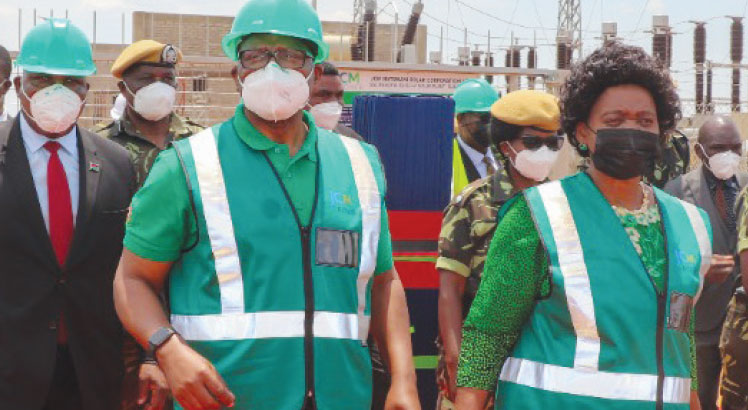New power plant raises hope on reducing tariffs
Consumers and experts have welcomed the commissioning of 60 megawatt (MW) JCM Power solar-powered plant with hope that electricity tariffs will go down following additional power to the national grid.
The additional power is also expected to give leeway to the government to do away with Agrekko’s expensive diesel generated power of about 70MW.
President Lazarus Chakwera yesterday commissioned the 60MW solar-powered plant in Salima which has improved power generation fromthe current 350MW to about 410MW, giving hope that with more similar investments, energy woes would end.
In his address when he commissioned the project by one of the country’s independent power producers (IPPs), the President lamented bureaucratic tendencies by some public officials which frustrate energy projects and contributed to the Salima project delays to about eight years.

Chakwera said: “Ultimately the bureaucratic bottlenecks that slow us down are caused by people and must be resolved by people.
“As a country, we simply cannot afford to be negligent and passive after any company reaches out to us for investment opportunities in the power market, not if we are going to reach our target of adding 1 000 megawatts to the grid in the next four years.”
Turning to IPP investors, he warned them against approaching the government in bad faith, especially those who express an interest to invest in the power sector when they have no capacity to do so.
The President, who is now overseeing the Ministry of Energy after firing Newton Kambala, has since directed that before the New Year, the Principal Secretary for Energy and the Director of Energy should report to his office any IPP that has written the ministry in the past two years expressing interest in investing in the sector and what has been done to move those investments forward.
The President described the 60MW JCM Power Solar photovoltaic in Malawi now connected to the national grid as a blueprint for future projects in a number of respects as it gives investor confidence in the renewable energy sector.
JCM Power chief executive officer Christian Wray said the continuous improvement of the energy situation in Malawi is critical to the economic development of the country; hence, hailed the government support to bring the project to commercial operations.
He said: “It is our belief that this significant step in the power sector in Malawi will be a catalyst to transform the sector and create a framework to attract more IPPs in Malawi.”
Wray said another 20MW solar project with power battery storage, which they are implementing at Golomoti in Dedza with support from the United Kingdom government, will be completed in due course.
British High Commission charge de’affaires Fiona Ritchie welcomed the emphasis on investment in power generation beyond hydro through alternative sources, including solar, and the need to provide incentives that attract private equity investment in the energy sector.
She said the launch of JCM Power signals government’s commitment but called for accelerated structural reforms of the main energy players that will be vital to ensure this vision is brought to reality in the near future.
Apart from the Salima project, other companies involved in the solar projects and their capacities currently at various levels of implementation include Nkhotakota Phanes Solar 21MW, Kanengo Voltalia Solar 17.5MW, Golomoti JCM Solar 20MW and Kanengo Atlas Solar 20MW and another IPP, Mulanje Hydro, which is providing eight MW power to the national grid.
Malawi Energy Regulatory Authority (Mera) said due to the progress made, the projects should be connected to the national grid within a year.
Of the 350MW national power supply, about 55MW is generated by diesel generators that Electricity Supply Corporation of Malawi (Escom) gets from Agrekko, but the plan was to switch off the generators once IPPs start supplying to the national grid, eventually reducing electricity tariffs.
Under the 2018-2022 Escom Base Tariff Schedule, Mera in October 2018 approved a 31.8 percent base tariff for the four-year period. The implementation of the base tariff was segmented into four annual tranches of 20 percent, 7.2 percent, negative three percent and 10 percent tariff adjustments for the first, second, third and fourth years in that order.
Consumers Association of Malawi executive director John Kapito, while saying the impact of the project will not be felt immediately, added that consumers expect to get affordable tariffs mid next year.
He said consumers are paying dearly because of the expensive Agrekko power, but with the anticipation of more IPPs connecting to the national grid, tariffs should go down including having Escom connecting more people on the waiting list.
Energy expert Grain Malunga said the impact from solar power will be maximised only if the solar system will have storage capacities to ensure uninterrupted power supply day and night.
In an earlier interview, Escom public relations manager Innocent Chitosi said the move by JCM will boost the country’s generation capacity.
Solar power remains sustainable and cheap as reflected in the company’s tariff model signed with Escom in the Power Purchase Agreement.
JCM will be selling electricity at $0.08 (about K65.44) per kilowatt hour (kWh) compared to $0.50 (about K409) per kWh Escom was sourcing from diesel generators by Agrekko Limited and Electricity Generating Company.





